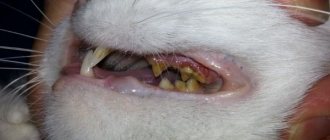Types of “safe” meat for cats
More than 80% of a cat's daily diet is meat. But, before feeding your mustachioed pet this product, you need to figure out which types of meat will be beneficial for the cat’s health and which types of this product can cause serious harm to the body.
First of all, you should focus on the following rules:
- the meat must be fresh;
- low-fat;
- without small and dangerous bones;
- no unpleasant odor.
You need to feed your cat high-quality meat, and not waste product that is not useful on the human table. From time to time, your pet can be pampered with offal and cartilage, always fresh and low-fat (no more than 200g per week).
To feed your cat, you can buy chicken, quail, lean lamb, beef, rabbit, turkey, horse, goat and beef.
Pork, duck, goose and fatty lamb are prohibited.
Now let's figure out in what form meat can be served to a domestic cat.
Grilled meat
Fried product is strictly prohibited for feeding domestic cats. After eating such meat, the animal may experience serious problems with the liver, stomach and other organs of the digestive tract. All this will lead to a lot of unpleasant health problems for the pet and will significantly shorten its lifespan.
Cooked meat
This meat can be given to a cat. It contains many nutrients that are beneficial for her body. The main thing is to cook the meat correctly: boil it in low-fat broth without salt and other spices.
And one more rule: you cannot give raw and cooked meat at the same time. To digest these foods, the body will need to produce different enzymes, which will negatively affect the digestion process. This may manifest itself as vomiting, stool disturbances and other unfavorable symptoms.
What meat should you not feed your cat?
The following products are prohibited:
- Fresh steam . Unprocessed meat is a potential source of harmful bacteria, helminth larvae and eggs.
- Salty . Salt disrupts the balance of minerals and retains fluid.
- Fried . Excess oil upsets metabolism.
- Canned . To increase shelf life, components harmful to cats are included: salt, seasonings, spices.
- Smoked . Wood smoke contains volatile carcinogens. When smoking for industrial purposes, meat is doused with an artificial liquid, which corrodes the gastric mucosa and causes an allergic reaction.
- Dried . The product is kept in a marinade with additives harmful to animals: salt, vinegar, spices, garlic.
- Meat waste . Bones, paws, and heads injure the digestive organs; cats do not digest chicken and turkey skin. The trimmings are taken from the surface of the piece, and therefore contain pathogenic microbes.
- Pieces larger than 2 cm . Large chunks are difficult to chew, making nutrients less absorbable.
- Meat puree . A cat's teeth need stress; if you constantly feed them soft food, they are destroyed. The puree is suitable for kittens or adult animals with digestive tract problems.
The table lists the varieties that should not be given to your pet:
| View | Harm to the cat |
| Pork | A protein to fat ratio of 14:33 is not good for a cat. Contains histamines. Possible source of parasites. |
| Goose | The muscle tissue of birds older than six months becomes tough and difficult to digest. Fat content reaches 38%, calorie content 369 kcal. |
| Mutton | Difficult to digest, high fat content. |
| Duck | In terms of calories and fat, it is comparable to goose. |
| Fresh liver | Poorly absorbed, causes diarrhea. |
| Raw chicken | There is a risk of salmonellosis infection. |
| Pork by-products | They have the same negative qualities as meat. |
| Raw lung | Not digestible, poor composition of nutrients. |
| Store-bought minced meat | Contains fat, skin. |
| Necks of domestic chickens | The vertebrae are too hard for cats. |
A one-time inclusion of fatty meat in your diet will not harm. With constant feeding, the animal develops problems. First, weight increases, and against the background of obesity, cardiovascular diseases and diabetes develop.
Is it possible to give a cat cheese?
Is it possible to give a cat valerian?
Is it possible to give a cat milk?
Mixed nutrition
There are three types of diet for domestic cats:
- natural nutrition from ordinary products familiar to humans;
- feeding with ready-made industrial feed created for animals;
- mixed diet, which involves feeding cats natural products in combination with ready-made food.
Natural food and raw meat
When feeding natural food, the issue with raw meat is resolved on its own. This product is included in the pet menu. It can be served in processed form. To get a more nutritious meal, veterinarians recommend combining meat pieces with other healthy foods.
Dry, wet food and raw meat
Is it necessary to feed a cat raw meat if it regularly eats ready-made industrial food?
What pathologies does raw meat contain?
The biggest risk to a cat from raw meat is the possibility of helminth infection. These parasites not only significantly worsen the general condition of the animal, but can also cause death.
To protect your cat from such risks, properly prepare fresh meat for feeding your pet! Buy this product only from trusted places, carefully checking it for freshness.
Be sure to freeze the meat before serving and heat treat it. For preventative purposes, periodically give your pet anti-helminth medications. An experienced veterinarian will tell you which drug is best to choose.
Is boiled beef good for a cat?
Then can cats eat raw beef or should it be cooked? Processing the meat at temperatures that are too high or too low—cooking or freezing—also ensures that no harmful bacteria remain in the meat. However, this is only one side of the coin. During cooking, of course, all parasites die, but beneficial elements are also evaporated. And the cat usually doesn’t like the taste of boiled beef as much as raw beef. Therefore, it is better to serve raw beef to your cat for a meal.
The body of a male and a female differs slightly, but in terms of the chemical composition required in the food consumed, the picture is similar. Another thing is that various substances are required for pets after castration or sterilization. Can a sterilized cat eat beef? If a cat wants to eat beef and loves it, then let him eat it, only raw. But it is worth remembering that the diet of sterilized animals should contain fewer calories, more protein, and less magnesium, phosphorus and calcium.
Castrated cats can eat raw beef, but how much do they need? Since cow meat contains a lot of protein and even more fatty acids, it is better for animals that have undergone sterilization to reduce their consumption of fatty meat. It will be more beneficial to dilute your cat's meals with dietary chicken or rabbit meat instead of feeding cats raw beef.
Meat for castrated and sterilized
As you know, it is very important for cats after sterilization and cats after castration to choose the right diet for feeding. After such operations, great changes occur in the animal’s body, metabolic processes slow down. With improper feeding, there is a high probability of developing certain diseases that significantly worsen the general condition of domestic cats.
After sterilization, cats can be given lean meat, but only in raw and frozen form! The boiled product is not particularly beneficial for the body of operated animals. In addition, boiled meat can provoke protein intoxication, a very dangerous condition for cats.
Portions must be dosed and served fresh. You can also add some types of offal in small quantities to the menu.
After castration, cats can also eat raw lean meat after preliminary freezing. Fractional meals in small portions are encouraged, up to 5-6 times a day.
The cat should not be given a supplement, even if he really asks for it. The restless appetite of a castrated animal often leads to obesity, as a result of which the cat develops other unpleasant health problems.
The importance of meat in the diet
Everyone knows that a cat is a carnivore, so its diet should contain 85–95% meat. Wild cats or those that live in rural areas can get food for themselves: mice, frogs, birds, lizards. Everything in the cat’s body is adapted for this.
Claws and strong teeth allow you to eat meat in portions. The esophagus is elastic and can easily accept large pieces. When mucus moves them through the stomach, it produces special enzymes to break down proteins, and gastric juice helps digest them. In a cat’s body, everything is designed in such a way that it completely digests only protein foods.
There are no enzymes for digesting plant or dairy products in the body of a predator. As for domestic cats, their gastrointestinal tract works in the same way and does not produce other enzymes. Of course, if your pet is fed non-protein food, it will not stagger from hunger, but the body will not have enough necessary microelements for normal functioning.
Thus, our homemade purrs need raw meat. Small kittens must receive pieces of raw meat for proper development. However, you must be 100% sure of its quality.
Is it possible to give raw meat to small kittens?
It is possible and even necessary to feed a small kitten raw meat! This product is especially useful not only for the body of a maturing predator, but also for its milk teeth. The first meat food can be introduced into the cat’s diet starting from 2 months of life.
For greater benefit, it is recommended to give the meat to the kitten with a bone, in the process of gnawing which, beneficial massaging of the gums and teeth occurs. Such prevention reduces the likelihood of developing tartar in animals.
The bones should not be small in size. It is unacceptable to give your kitten chicken and fish bones. They are dangerous for animals, as they can injure the esophagus and other organs of the digestive tract.
Also, you should not give your cat boiled bones, which are softer in structure. This product can also cause gastrointestinal problems.
What kind of meat can you feed a kitten? Fresh, low-fat and processed! This product is best served in small pieces. To complete your diet, mix meat with healthy cereals and vegetable purees.
How to teach a kitten to love meat
As soon as the baby is 1.5 months old, it’s time to offer him dishes from the “adult” table and teach him the main dish - meat. Don't expect the little predator to be overjoyed and start furiously tearing pieces off the new dish. The baby has not yet awakened many instincts, and he may simply refuse meat.
To increase the chances of success, raw meat is minced and the resulting minced meat is rolled into small balls. They are frozen in the freezer, taking one out every day and warming it to room temperature. If the cat does not dare to try the treat, the meat can be mashed and mixed with cottage cheese.
From 2 months, the baby is already able to chew solid food, so it is not necessary to make minced meat, and the pieces of meat themselves can be cut into larger pieces.
At 3 months, the kitten should receive a fish dish once a week. First, the bones are removed from the fish, the fins and entrails are removed. It is not recommended to give babies river fish, even boiled ones.
With a properly formulated diet, cats live happily with their owners for up to 20 years. To avoid problems, healthy foods should be included in the kitten's diet from a very young age.
How often to feed meat, and in what quantity?
Meat is the most important product in the diet of a domestic carnivore. It must be given to the cat every day. According to generally accepted standards, 80-90% of a pet’s daily diet is meat.
The amount of product to feed is calculated individually, depending on the age of the cat and its activity.
On average, kittens need 30g of meat per day, adults – about 100g. If the cat is overly active and spends a lot of time playing outdoor games, you can slightly increase the dosage of this product.
But, in order not to harm your pet’s health, we still recommend that you first consult with a veterinarian, who can accurately determine the norm for feeding your cat with meat products, taking into account its age, weight and activity level.
And remember, proper feeding is the key to a long and happy life for a domestic cat in your friendly family!










